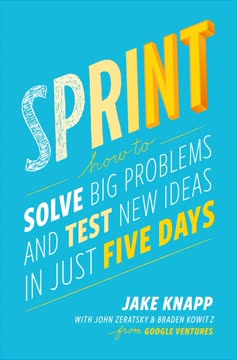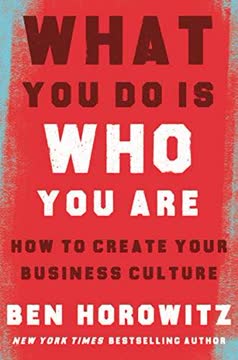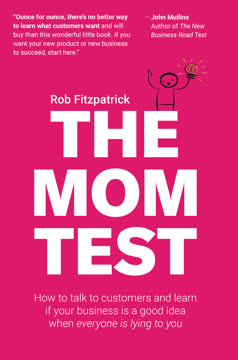Key Takeaways
1. Embrace transparency and vulnerability to build trust and improve team performance
If people have to cry in the bathroom, you're fucking up.
Psychological safety is crucial for team success. Research shows that teams with high psychological safety outperform those without it. This means creating an environment where team members feel comfortable expressing personal issues, sharing mistakes, and speaking up without fear of harsh criticism or judgment.
To foster psychological safety:
- Encourage open communication about work and personal challenges
- Lead by example, sharing your own vulnerabilities and mistakes
- Recognize and reward honest feedback and constructive criticism
- Create opportunities for team bonding and personal connections
By embracing transparency and vulnerability, you build trust, improve team cohesion, and ultimately drive better performance and innovation.
2. Focus on core strengths instead of diversifying prematurely
Great companies are almost universally fed by a powerful, ongoing set of marketing processes that earn attention from the right audiences and bring them to the company's (physical or virtual) doorstep.
Resist the temptation to diversify too quickly. Many startups make the mistake of expanding into multiple products or markets before establishing a strong foundation in their core offering. This can lead to diluted focus, stretched resources, and diminished quality across all offerings.
Instead:
- Identify your company's unique strengths and core competencies
- Double down on improving and expanding your primary product or service
- Build a strong brand and customer base in your core market
- Only consider diversification when you've achieved significant traction and have excess resources
By maintaining a laser focus on your core strengths, you can build a solid foundation for future growth and expansion.
3. Prioritize customer retention over acquisition for sustainable growth
Subscriber retention versus customer acquisition.
Retention is key for sustainable growth, especially in subscription-based businesses. While acquiring new customers is important, retaining existing ones is often more cost-effective and leads to higher lifetime value.
To improve customer retention:
- Invest in product quality and user experience
- Implement a customer success program to help users get the most value
- Regularly collect and act on customer feedback
- Create loyalty programs or incentives for long-term customers
- Focus on solving customer problems and delivering consistent value
By prioritizing retention, you can build a more stable revenue base and reduce the pressure to constantly acquire new customers, leading to more sustainable growth over time.
4. Understand the venture capital model and its implications before raising funds
Personal happiness and successfully raising venture capital are rarely correlated.
Venture capital is not suitable for every startup. The VC model typically requires rapid growth and a large exit (acquisition or IPO) to generate returns for investors. This can create pressure to scale quickly, sometimes at the expense of profitability or long-term sustainability.
Before seeking venture capital, consider:
- Your growth aspirations and willingness to aim for a large exit
- The potential loss of control and decision-making power
- Alternative funding sources (bootstrapping, angel investors, crowdfunding)
- The impact on company culture and employee expectations
If you do decide to raise VC funding, be prepared for the pressures and expectations that come with it, and ensure your goals align with those of your investors.
5. Develop a scalable marketing flywheel rather than relying on growth hacks
Growth hacks alone can't solve all your marketing problems, but the right ones may add immense value to an already humming marketing flywheel.
Build a sustainable marketing engine. While growth hacks can provide short-term boosts, they often don't lead to long-term, sustainable growth. Instead, focus on creating a scalable marketing flywheel that consistently attracts and converts customers.
Elements of a strong marketing flywheel:
- Content marketing that addresses customer pain points
- SEO to drive organic traffic
- Social media engagement and community building
- Email marketing for nurturing leads and retaining customers
- Referral programs to leverage word-of-mouth
- Continuous optimization based on data and customer feedback
By developing a comprehensive marketing strategy that builds upon itself over time, you create a more predictable and sustainable growth model for your business.
6. Create a dual career track to retain top individual contributors
There is a deeply held misconception in business culture that people management is (a) the only way to lead and (b) the only way to advance one's career.
Value individual contributors equally to managers. Many companies lose top talent by forcing skilled individual contributors (ICs) into management roles for career advancement. Create a dual career track that allows ICs to progress in title, compensation, and influence without becoming people managers.
Benefits of a dual career track:
- Retains top technical talent who may not excel in or desire management roles
- Allows employees to focus on their strengths and passions
- Provides diverse career options for employees
- Ensures management roles are filled by those with genuine interest and aptitude
Implement this by creating parallel advancement paths for ICs and managers, with equivalent levels of recognition, compensation, and influence at each stage.
7. Invest in self-awareness and behavioral change for personal and professional growth
When you find a real truth about yourself, or a truth about your company, it's going to have that same feeling. The truths we hide about ourselves and our creations stay secret because we bury them in layers of guilt and shame, of fear and self-loathing.
Self-awareness is a superpower. Developing a deep understanding of your strengths, weaknesses, motivations, and blind spots is crucial for personal and professional growth. This self-knowledge allows you to make better decisions, build stronger relationships, and lead more effectively.
To improve self-awareness:
- Seek regular feedback from peers, mentors, and subordinates
- Practice mindfulness and reflection
- Keep a journal to track thoughts, emotions, and patterns
- Work with a coach or therapist to uncover deeper insights
- Be open to challenging your own assumptions and beliefs
Remember that self-awareness is an ongoing journey, not a destination. Continuously invest in understanding yourself and your impact on others to become a more effective leader and individual.
8. Balance product development between minimum viable and exceptional
Great products are rarely "minimally viable".
Find the sweet spot between minimum viable product (MVP) and exceptional viable product (EVP). While the lean startup methodology emphasizes rapid iteration and learning through MVPs, launching a subpar product can damage your brand and make it harder to gain traction.
Considerations for product development:
- Start with a small, well-executed core feature set
- Gather feedback from trusted advisors and potential customers
- Iterate based on user feedback, but don't rush to launch prematurely
- Ensure your product solves a real problem better than existing solutions
- Balance speed to market with quality and user experience
Aim to create a product that is both viable and impressive enough to generate positive word-of-mouth and retain early adopters.
9. Consider early acquisition offers seriously, weighing pros and cons
Twenty-five million dollars.
Evaluate acquisition offers carefully. While the startup culture often glorifies building unicorns and going public, early acquisitions can provide significant benefits for founders, employees, and investors. Don't dismiss acquisition offers without careful consideration.
Factors to consider when evaluating an acquisition offer:
- Personal financial goals and life circumstances
- The potential for future growth versus current valuation
- Impact on employees and their career prospects
- Market conditions and competitive landscape
- Alignment with your long-term vision for the company
- The acquirer's culture and plans for your product/team
Remember that turning down an acquisition offer doesn't guarantee a better outcome in the future. Weigh the risks and rewards carefully, and be open to opportunities that could provide a positive outcome for all stakeholders.
10. Recognize and combat depression in entrepreneurship
Depression was a catalyst for me to seek professional therapy and professional coaching, something I hadn't done previously in my career.
Mental health matters. Entrepreneurship can be an emotionally challenging journey, often leading to stress, anxiety, and depression. Recognizing the signs of depression and taking proactive steps to address mental health is crucial for both personal well-being and business success.
Strategies for maintaining mental health:
- Seek professional help through therapy or coaching
- Build a support network of fellow entrepreneurs and mentors
- Practice self-care through exercise, meditation, and hobbies
- Set boundaries between work and personal life
- Be open about mental health struggles with trusted team members
- Focus on behaviors and habits, not just outcomes
Remember that seeking help is a sign of strength, not weakness. By prioritizing mental health, you'll be better equipped to handle the challenges of entrepreneurship and lead your team effectively.
Last updated:
FAQ
What's Lost and Founder about?
- Startup Insights and Realities: Lost and Founder is a candid exploration of the startup world, detailing Rand Fishkin's experiences as the founder of Moz. It provides a behind-the-scenes look at the challenges, failures, and successes he faced while building a tech company.
- Cheat Codes for Founders: The book serves as a "cheat code" for aspiring entrepreneurs, offering practical advice to avoid common pitfalls. Fishkin emphasizes the importance of mentorship and learning from others' experiences.
- Dismantling Myths: Fishkin challenges the glorified narratives surrounding startup success, revealing the harsh realities many founders face, including financial struggles and personal sacrifices.
Why should I read Lost and Founder?
- Honest Perspective: Fishkin's storytelling provides an unfiltered look at the startup ecosystem, making it a valuable read for anyone considering entrepreneurship.
- Practical Advice: Readers will find actionable insights and strategies that can be applied to their own ventures, such as the importance of transparency and self-awareness in leadership.
- Cultural Critique: The book critiques the startup culture that often prioritizes growth over well-being, encouraging readers to reflect on their values and motivations.
What are the key takeaways of Lost and Founder?
- Value of Transparency: Fishkin emphasizes that transparency fosters trust within teams and with customers, ultimately leading to better outcomes.
- Self-Awareness is Crucial: Understanding one's strengths and weaknesses as a founder is essential for effective decision-making and team dynamics.
- Customer Empathy: Fishkin stresses the importance of understanding customers' needs and experiences to create successful products.
What are the best quotes from Lost and Founder and what do they mean?
- "It’s dangerous to go alone.": Highlights the importance of building a supportive network of mentors and peers in the startup world.
- "Real values don’t help you make money (in the short term).": Emphasizes that long-term success is built on strong values, even if they come at a short-term cost.
- "Execution is everything.": Stresses that having a great idea is not enough; successful startups require effective execution of their plans.
How does Lost and Founder address the myth of the "startup founder"?
- Challenging Stereotypes: Fishkin dismantles the myth that all startup founders are young, wealthy, and tech-savvy, highlighting the diversity of backgrounds among successful entrepreneurs.
- Reality of Failure: Presents statistics showing that most early-stage technology companies fail to return their investors’ capital, contrasting with glorified media narratives.
- Personal Journey: Fishkin shares his own unlikely path to becoming a tech founder, emphasizing perseverance and learning from failure.
What is the "Startup Cheat Code" mentioned in Lost and Founder?
- Connections and Mentorship: Refers to leveraging relationships with experienced entrepreneurs and mentors to navigate challenges.
- Learning from Others: Having a network can help avoid unnecessary pitfalls and lead to better decision-making.
- Community Support: Building a community of support among founders can provide emotional and practical assistance.
What lessons does Lost and Founder offer about leadership?
- Transparency is Key: Being open and honest with team members builds trust and fosters a positive work environment.
- Empathy in Leadership: Leaders should show vulnerability and care for their team's well-being, enhancing team performance.
- Focus on Team Development: Effective leaders invest in their team's growth, creating pathways for advancement without forcing management roles.
How does Lost and Founder define "self-awareness" as a superpower?
- Understanding Strengths and Weaknesses: Recognizing one's own strengths and weaknesses is crucial for effective leadership.
- Impact on Team Dynamics: Self-aware leaders create a more cohesive team environment, improving communication and collaboration.
- Continuous Growth: Self-awareness is a continuous process of reflection and learning, essential for personal and professional growth.
What is the concept of the "Minimum Viable Product" (MVP) in Lost and Founder?
- Definition of MVP: An MVP is a product with just enough features to satisfy early adopters and gather feedback for future development.
- Focus on Quality: Fishkin critiques the traditional MVP approach, suggesting it often leads to subpar products and advocates for an "Exceptional Viable Product" (EVP).
- Iterative Development: Emphasizes the importance of iterating based on user feedback rather than rushing to market with an incomplete product.
How does Lost and Founder discuss the impact of mental health on entrepreneurship?
- Personal Struggles: Fishkin shares his experiences with depression and anxiety, illustrating their impact on leadership and decision-making.
- Seeking Help: Encourages entrepreneurs to seek professional help and support when facing mental health issues.
- Creating a Supportive Culture: Advocates for fostering a workplace culture that prioritizes mental health and well-being.
What are some common mistakes founders make, according to Lost and Founder?
- Ignoring Financial Realities: Warns against overlooking financial issues and emphasizes proactive financial management.
- Overvaluing Growth: Cautions against prioritizing rapid growth at the expense of sustainability, which can lead to burnout.
- Neglecting Team Dynamics: Stresses the importance of fostering a positive company culture and aligning values with the team.
How does Lost and Founder address the challenges of scaling a startup?
- Growth vs. Quality: Discusses the tension between rapid growth and maintaining product quality, warning against diluted focus.
- Resource Allocation: Highlights the importance of effectively allocating resources to support growth without overextending the team.
- Learning from Mistakes: Encourages continuous learning and adaptation, reflecting on experiences to adjust strategies accordingly.
Review Summary
Lost and Founder receives high praise for its honesty and transparency about startup life. Readers appreciate Rand Fishkin's candid insights into his experiences building Moz, including successes and failures. Many find the book valuable for its practical advice on marketing, management, and navigating the startup world. Some readers note occasional self-righteousness or bitterness, but overall, the book is highly recommended for entrepreneurs and those interested in the realities of building a tech company. Its raw, truthful perspective sets it apart from typical startup literature.
Similar Books










Download PDF
Download EPUB
.epub digital book format is ideal for reading ebooks on phones, tablets, and e-readers.




